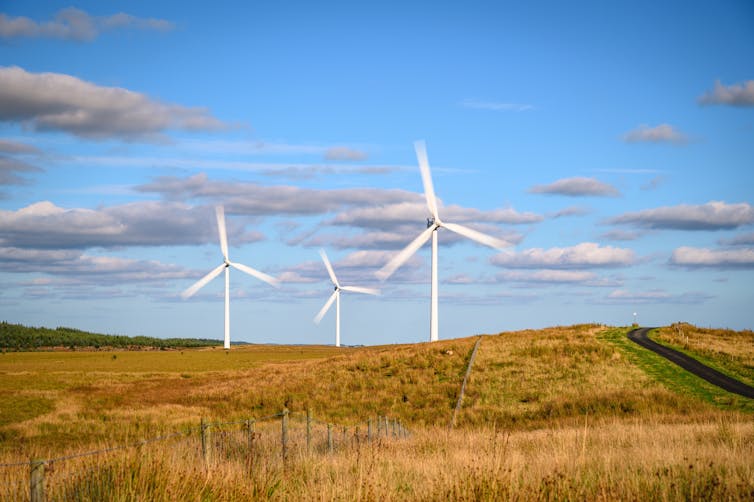Liz Truss's energy plan freezes bills – but leaves dysfunctional market intact
Truss heads off imminent crisis while storing up problems for the long term.
Sept. 8, 2022 • 8 min • Source
The energy payments package announced by Prime Minister Liz Truss tackles one immediate problem: it heads off soaring household energy bills by capping them at around £2,500 a year until 2024 and offers to hold down prices for businesses. Essentially, the government will cover a sizeable share of your energy bill for two years by paying energy supply companies the difference between their wholesale costs (at which they buy energy in bulk) and those capped consumer prices.
By restraining bills rather than paying consumers directly, Truss hopes to temper inflation. The package is estimated to cost the government around £150 billion. The question is whether it solves any of the problems plaguing the energy system itself (the answer: not really) and whether it risks diverting attention from needed reforms.
Many have already remarked on the irony of a small-state Conservative prime minister embarking on one of the largest interventions in modern times. Absolutely, something had to be done, but two choices are notable.
One is to give succour to all energy consumers, rather than target support for those who most need it. Rich and poor alike will share in the government’s largesse (and the more energy you consume, the more you benefit from the relief).
The fuel-poor will remain by far the hardest hit by bills remaining at least double pre-crisis levels. Their share of expenditure on energy will likely still be double that of rich households .
The other choice is how the package will be paid for. Truss ruled out new windfall taxes (though reports suggest she won’t cancel Rishi Sunak’s higher rate three-year levy on oil and gas producer profits, estimated to raise around £5 billion in its first year).
The profits reported by Shell and BP alone in the first six months of 2022 totalled around £30 billion. In electricity, estimates from my own research group suggest that increased profits in the electricity wholesale market in 2022 must be at least £10 billion, probably much more.
If this is the backdrop for the new chancellor, Kwasi Kwarteng, declaring his intention to maintain “ fiscal discipline ”, it would imply gargantuan public sector cuts are in store. Truss has indicated instead the package will be mainly funded through borrowing – increasing UK debt and associated interest.
Fossil fuel fantasies
Truss also announced plans to license new offshore oil and gas drilling (something the government had already encouraged with 80% investment allowance exemptions in Sunak’s windfall tax ) and overturn the moratorium on fracking. This will have almost no impact on energy costs for UK consumers. The volume of new gas it could release over the next few years will be trivial , and unless Truss prevents the output from being sold on the international market, the move will not dent the domestic oil or gas price.
The apparent rush to open up the country to fracking, aside from the many obstacles , is apparently not matched by easing the enormous barriers placed in the way of ( much cheaper and quicker to deploy ) onshore renewables.

Amid Truss’s rhetoric of encouraging investment through low taxes, major energy companies must be wondering what to do. If the whole world rushes to produce new fossil fuels then the price will in due course collapse, bringing an end to their recent run of record profits.
They also know that not only is the future market outlook unstable, but climate change is getting worse. Government actions have the effect of loading up energy producers with cash while trying to point them in a direction they know is unsustainable.
An electric opportunity
The package is a blank sheet when it comes to electricity. Truss’s recent intervention aside, electricity accounts for half of household energy bills and it is electricity, more than gas prices, which risks making some British industries globally uncompetitive. In UK and European markets, unlike in many other countries, gas sets the price of electricity , even though non-fossil sources account for more than half of generation .
Read more: Renewables are cheaper than ever – so why are household energy bills only going up?
The reason is a pricing structure that is no longer fit for purpose. One would never guess from the current package that the most recent contracts for new renewable sources – including large volumes of offshore wind – cost less than a quarter of the wholesale price of generating electricity from fossil fuels. And they are by far the fastest growing contributors to electricity generation in the UK.
The structure of the electricity system itself is unsustainable. Gas, now the most expensive operating source required to keep the lights on, sets the price of electricity across the entire wholesale electricity market , and this cannot continue as its role shrinks further. The obvious solution is to decouple non-fossil electricity from the gas-driven wholesale price of electricity.
One option could be to create a channel for consumers to directly access sources of renewable energy at their average cost. This “green power pool” could offer cheap electricity to three groups in particular. The two obvious priorities are the most vulnerable households and those industries which need to use lots of electricity, like electric arc steelworks and many chemical factories.

But equally important for the future are those consumers moving away from gas and oil to flexible zero-carbon energy, for transport (electric vehicle owners) and heating (people using heat pumps for heating and hot water instead of a gas boiler). Both allow energy (electricity or heat) to be stored in a way that helps make more extensive use of the cheapest but variable energy sources, wind and solar.
The package seeks to deal with the present crisis by gambling the future, both financially and environmentally. Liz Truss and the new government will have their work cut out to prove they have more durable solutions, before the future bites back.
Michael Grubb receives funding from UCL and UK Research Councils. He secured additional support for recent research on the energy crisis from the Aldersgate Group and the Institute of New Economic Thinking. He was formerly senior advisor to Ofgem and chair of the UK government's panel of technical experts on electricity market reform.

